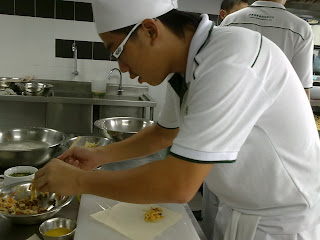Alright lets start with some boring facts about some foods that we always eat in our daily life.
Bulbous/bulbs(Alliums)
Bulbs are perennial bulbous plants that have a characteristic pungent flavor and aroma. In culinary terns they are the most important flavor enhancer next to salt and are used in the cuisines of almost every country worldwide. They vary in intensity from variety. The pungency can be tempered with long slow cooking or through an understanding of the quantities of each variety. Examples of bulbous plants - leeks, onion, spring onion, garlic, shallot. If we can clearly understand each flavor of these plants, we can fully utilize the flavor and create a more pleasant flavor of the food we cook.
Stocks
The preparation of stocks has been simplified in many ways since the days of Escoffier, although this does not mean that it demands less care or skill. Few chefs today bother to tie vegetable for a stock into a bundle, for example. They're going to be strained out anyway. The number and variety of ingredients is usually not as great as it once was. Nor is it common to cook stocks for as many hour as were once thought necessary.
A stock may be defined as a clear, thin (that is, un-thickened) liquid flavor by soluble substance extracted from meat, poultry, and fish, and their bones, and from vegetable and seasonings, Our objective in preparing stocks is to select the proper ingredients and then to extract the flavors we want, in other words, to combine the correct ingredients with the correct procedure. Stocks are very important when we are going to cook something for example braised cabbage without a good vegetable stock we can never achieve good taste while making this dish, thats why a good stock equals to a good dish.
lets take a look at the outcome of a good food produced by a good stock =)

while it is in the sauteing pan
look cool in the chef jacket eh ? now really macam chef di hahaha !
btw lets take a look at my leng zai chef in my class
Now i want to talk about another common food in the kitchen
Pasta
Pasta is made from strong wheat flour, known as durum flour, made into dough by the addition of water, olive oil and eggs. There are two main types of pasta, dried and fresh home made. Dried pasta is available in at least 56 different shapes, each of which has name and is widely used because of the convenience and the fact that the shelf life is up to 2 years if it is properly stored. Fresh pasta is more and more readily available in a variety of shapes, color and flavors from suppliers and there are machines for those who wish to produce their own pasta.
Pasta can be served for lunch, dinner, supper or as a snack meal and also used as an accompaniment or garnish to other dishes. Traditionally dried pasta is cooked "al dente", which means " firm to the bite" or "soft on the outside, firm in the inside". So i hope you all learn something from what i written here.
Alright lets look at some dishes made from pasta - spaghetti bolognaise
actually its easy to make and taste better from those supermarket cambells whatever sauce. Try it =D





















 while it is in the sauteing pan
while it is in the sauteing pan












